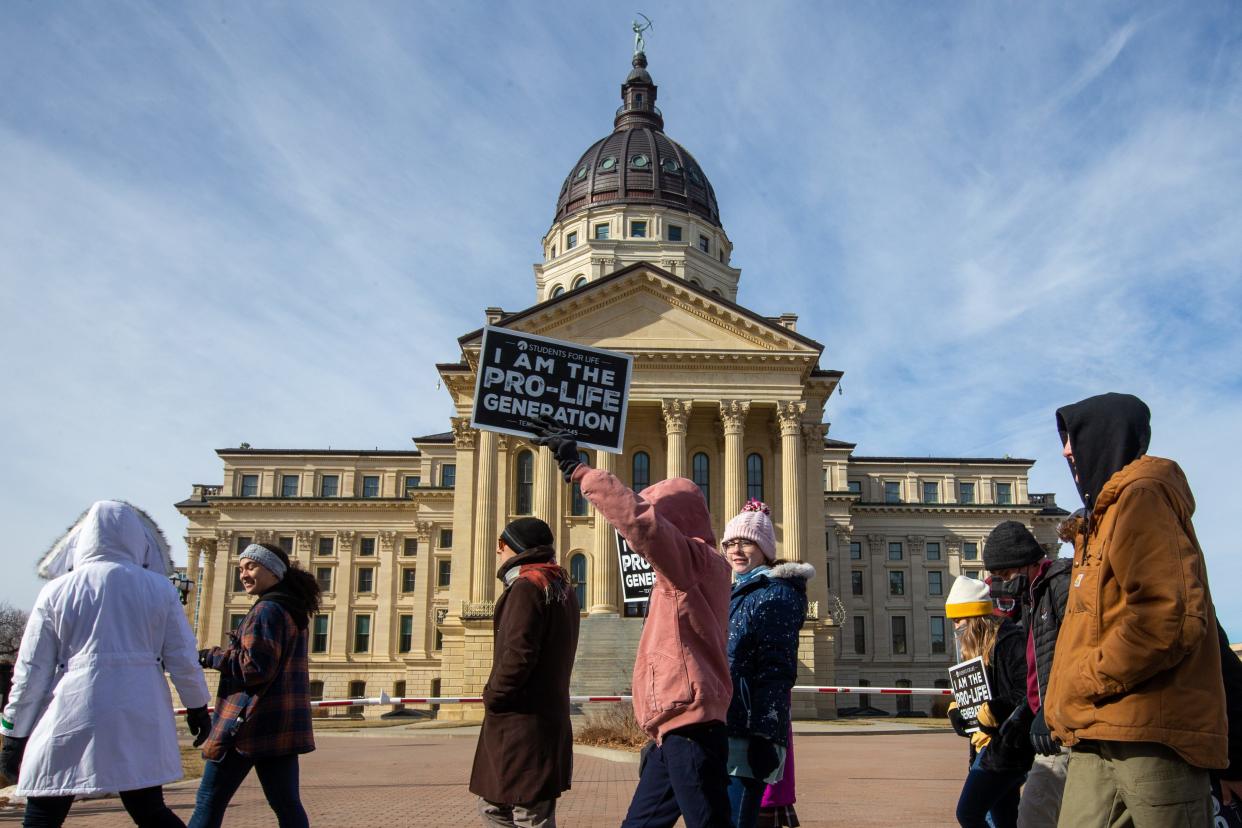Roe v. Wade was overturned. How does Kansas abortion change after the Supreme Court ruling?

The move by the U.S. Supreme Court Friday to overturn the longstanding Roe v. Wade decision legalizing abortion nationally will have few immediate impacts on Kansas — but could in the months or years to come.
The 6-3 ruling does, however, mean voters will dictate the future of health care access in Kansas when they weigh in on a proposed anti-abortion amendment to the Kansas Constitution in August.
That vote will have national reverberations, serving as the first major crossroads for abortion post-Roe in the United States.
More: Texas now has the toughest abortion restrictions in U.S. What does that mean for Kansas
Is abortion legal in Kansas now?
Abortion remains legal in Kansas, which has two abortion clinics in suburban Kansas City and two in Wichita, and the United States as a whole.
The Kansas Supreme Court ruled in a 2019 decision that the state constitution confers the right to an abortion, striking down a first-in-the-nation measure to ban dilation and evacuation procedures, a common second trimester abortion practice.
That means that even though the justices voted to overturn Roe, meaning state lawmakers across the country will be able to more strictly regulate or ban abortion, Kansas protections will remain intact — for now.
More: Kansas voters first to weigh in on abortion post-Roe v. Wade as procedure remains legal
Does Kansas have a trigger law banning abortion?
Unlike 21 other states, such as Missouri, Kansas has no law that kicks in to ban abortion now that Roe has been overturned.
Given that many of its neighbors do have a so-called "trigger law," however, more women are likely to come to Kansas seeking an abortion.
More: Abortion numbers rise in Kansas, but patient counts from Texas and Oklahoma drop
Data from the Guttmacher Institute, a research group favoring abortion rights, shows as many as 7.7 million women would have their nearest abortion provider be in Kansas if the practice were to be banned in other states.
What is the abortion constitutional amendment in Kansas?
The 2019 Kansas Supreme Court decision angered conservatives and led to a push to put a constitutional amendment before voters to state the constitution does not allow for abortion rights.
Lawmakers voted in 2021 to do just that, controversially placing it at the same time as the August partisan primary election.
Anti-abortion groups, such as Kansans for Life, have insisted in campaigning for the constitutional amendment that their endgame is not a total ban on abortion but rather re-instituting abortion restrictions that have been struck down by courts over the years.
But opponents of the amendment say there are few protections stopping lawmakers from electing to institute a ban if the amendment were to pass.
In a statement, Ashley All, spokesperson for Kansans for Constitutional Freedom, the principal abortion rights coalition opposing the amendment, said in a statement after the draft opinion leaked that "there is very little protecting us from a complete ban on abortion."
"It is important to remember that abortion is already heavily regulated in Kansas. Kansas law already bans abortion after viability and government funding of abortion to name a few," All said. "We must work together to protect our freedom and constitutional right to make personal health decisions free from government interference."
What would a yes vote on the amendment mean?
Voting yes on the amendment would clarify that the Kansas Constitution doesn't confer a right to an abortion. This would give lawmakers the freedom to pass more restrictions on abortion in Kansas, without the courts weighing in.
What would a no vote on the amendment mean?
Voting no on the amendment would effectively leave the status quo in place, allowing for current abortion access to continue and meaning courts could still block lawmakers from attempting to past new restrictions.
Will the amendment ban abortion in Kansas?
Not directly, though its long-term impact on abortion in Kansas is a subject of much debate.
Proponents of the amendment have played down any potential effort to restrict abortion, such as an Oklahoma law limiting abortion to instances of rape, incest or life-threatening medical emergencies.
Legislation introduced in the Kansas House, however, would have only allowed for abortion in the event of a miscarriage or ectopic pregnancy. While it gained no traction in 2022, it shows there is interest in more stringent abortion restrictions.
Those opposing the amendment have seized on this to argue it will be a stepping stone to an inevitable abortion ban.
How can I vote on the amendment?
While the vote will occur during the Aug. 2 partisan primary, all Kansans can vote on the amendment, even if they are unaffiliated with a political party.
Residents have until July 12 to register to vote and until July 26 to request an advanced mail ballot.
As always, individuals can register to vote online or at their local county elections office. Individuals can also confirm their registration status and look up what will appear on their ballot at the secretary of state's Voter View website.
More: Here's how you can register to vote in Kansas, and why it's a good idea to do it soon
Andrew Bahl is a senior statehouse reporter for the Topeka Capital-Journal. He can be reached at abahl@gannett.com or by phone at 443-979-6100.
This article originally appeared on Topeka Capital-Journal: How Kansas abortion laws are impacted as Roe v. Wade is overturned

